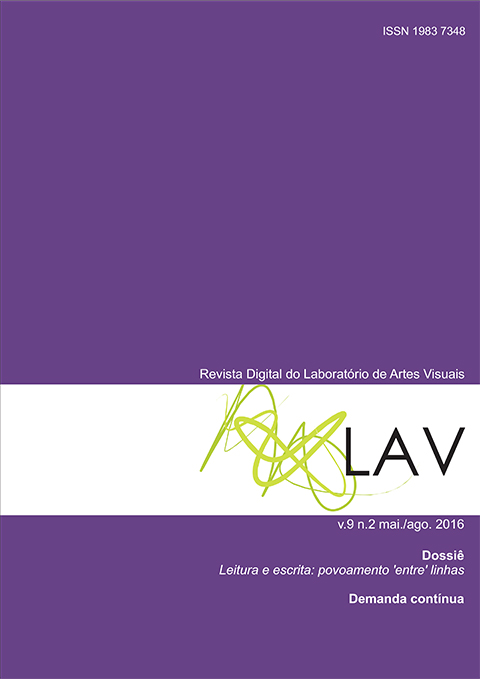Literary aporias: borgean issues in education
DOI:
https://doi.org/10.5902/1983734823517Keywords:
Reading, Literature, Borges, EducationAbstract
This paper approaches a certain universe of the Borgean literature from three points unfolded in Education themes. They are signs attempting to point out to the reader an emphasis on the ways of reading as active precursors of an imagination police in Education. Such police converts literature into a device that composes, together with the reading act, a state of poetic humor that drags the classifying impetuses to the field of potencies of the imaginary. This emphasis on the ways of reading may be evidenced in the following aspects: 1) Borges’ invention (the subjectivation as a variation effect), 2) Knowledge as fabulation (the erosion of truth as essence), and 3) Anachronism as a didactic procedure (a didactics of ways of reading).Downloads
References
BADIOU, Alain. Da vida como nome do ser. In. ALLIEZ, Éric. Gilles Deleuze: uma vida filosófica. (Coord. De trad. Ana Lúcia de Oliveira). São Paulo: Ed. 34, 2000, p. 159-167.
BORGES, Jorge Luis. O fazedor (Trad. Josely Vianna Baptista). São Paulo: Companhia das Letras, 2008.
BORGES, Jorge Luis. Outras inquisições. (Trad. Davi Arriguchi Jr.). São Paulo: Companhia das Letras, 2007.
BORGES, Jorge Luis. Ficções (Trad. Davi Arriguchi Jr.). São Paulo: Companhia das Letras, 2005.
BORGES, Jorge Luis. Obras completas 1923-1972. Buenos Aires: Emecé Editores, 1974.
CALVINO, Ítalo. Seis propostas para o próximo milênio (Trad. Ivo Barroso). São Paulo: Companhia das letras, 2000.
CAILLOIS, Roger; BORGES, Jorge Luis. Diálogo fugaz. Vuelta Sudamericana. Montevideo. Maio, 1987.
DESCARTES, René. Discurso do Método. Para bem conduzir a própria razão e procurar a verdade nas ciências. (Tradução Maria de Lourdes Teixeira.) São Paulo: Martins Editora, 1955.
FOUCAULT, Michel. As palavras e as coisas (Trad. Salma Tannus Muchail). São Paulo: Martins Fontes, 1995.
MONEGAL, Emir Rodríguez. Borges: uma poética da leitura (Trad. Irlemar Chiampi). São Paulo: Perspectiva, 1980.
NIETZSCHE, Friedrich. Sobre verdade e mentira no sentido extra-moral (Trad. Rubens Rodrigues Torres Filho). In: Obras incompletas (Col. Os pensadores). São Paulo: Abril Cultural, 1978, p. 43-52.
PAZ, Octavio. Traducción: literatura y literalidade. Belo Horizonte: FALE/UFMG, 2009.
SNOW, Charles Percy. As Duas Culturas e uma segunda leitura: uma versão ampliada das Duas Culturas e Revoluções Científicas. Saço Paulo: EDUSP, 1995.
VALÉRY, Paul. Variedades. (Trad. João Alexandre Barbosa.) São Paulo: Iluminuras, 1991.
VALÉRY, Paul. Variations sur les Bucoliques. Paris: Gallimard, 1956.
WALLERSTEIN, Immanuel et al. Para abrir as ciências sociais. São Paulo: Cortês, 1996.






